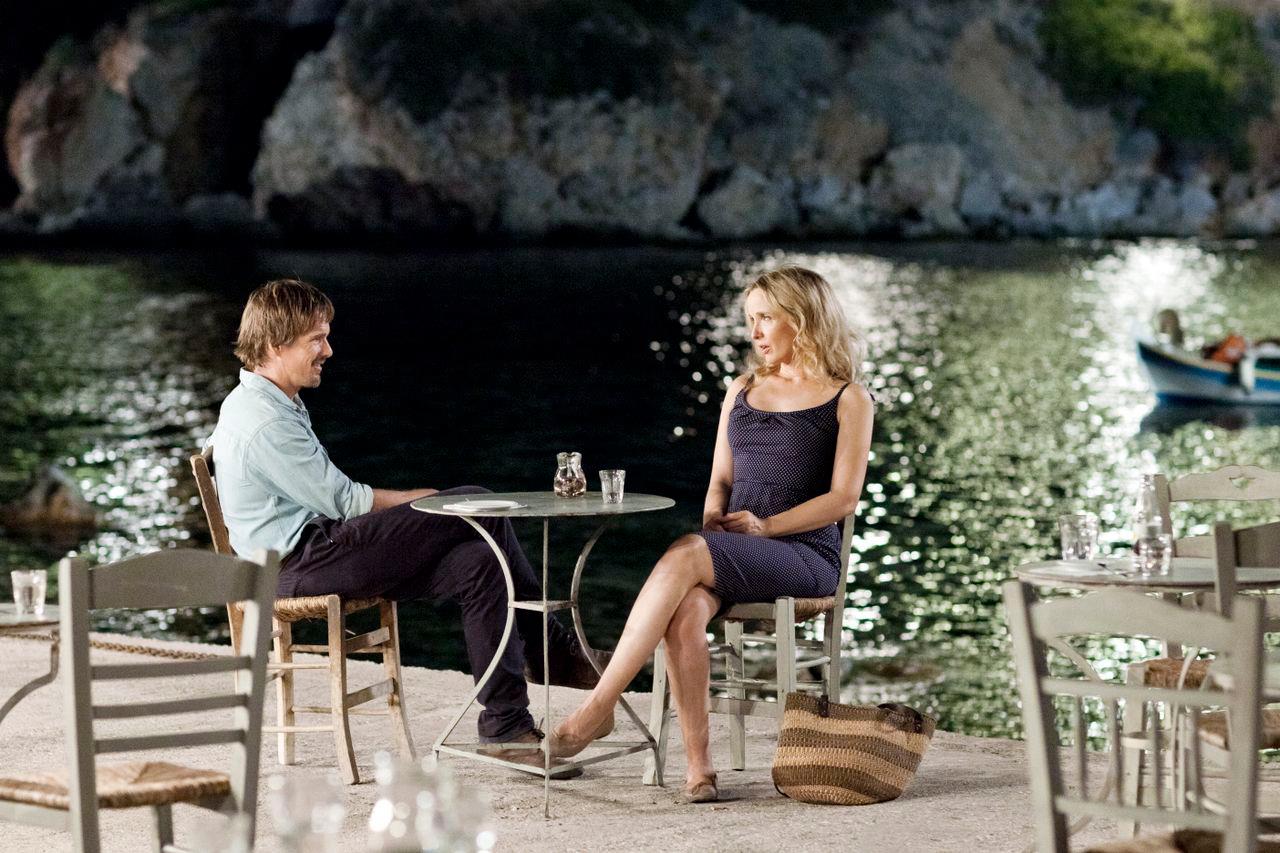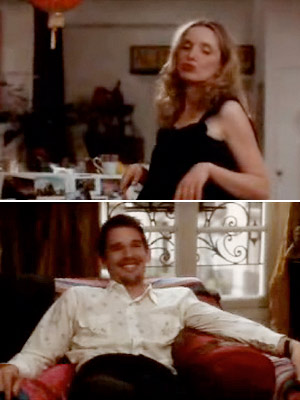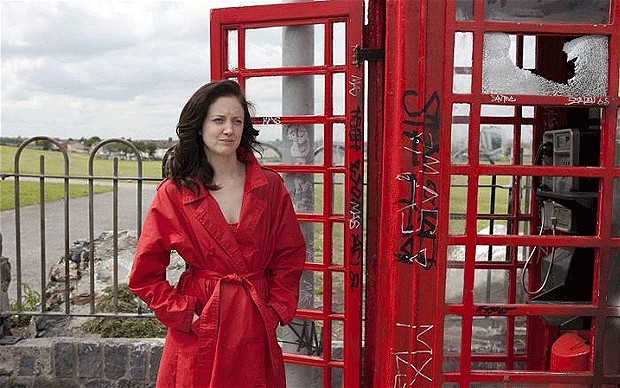The Magical Thinking of Before Midnight
 I first saw Scenes From a Marriage, Ingmar Bergman’s 1973 Swedish TV series, at the apartment of a man I’d been considering sleeping with for a while. He’d projected it against a wall painted white expressly for our screening, and we sat through about 45 minutes before he shut it off and turned to me. “This is not sexy,” he said flatly, and we promptly fell upon each other like wild dogs. The affair lasted four months, the precise length of time you can date someone before it deepens into something more serious. I wasn’t surprised. We’d consummated the relationship in the long shadow of a film that denied us any shared illusions about love before experience could do that for us.
I first saw Scenes From a Marriage, Ingmar Bergman’s 1973 Swedish TV series, at the apartment of a man I’d been considering sleeping with for a while. He’d projected it against a wall painted white expressly for our screening, and we sat through about 45 minutes before he shut it off and turned to me. “This is not sexy,” he said flatly, and we promptly fell upon each other like wild dogs. The affair lasted four months, the precise length of time you can date someone before it deepens into something more serious. I wasn’t surprised. We’d consummated the relationship in the long shadow of a film that denied us any shared illusions about love before experience could do that for us.
Before Midnight, Richard Linklater’s third film about the romance of Celine (Julie Delpy) and Jesse (Ethan Hawke) (not counting the couple’s cameo in the director’s animated Waking Life), is the first in this series that smacks of Bergman—that Bergman, in particular. That’s a big old blast of relationship reality. And no matter how well-rendered, it isn’t the movie magic we clamor for even when it’s what we need. I’m not convinced we ever do.
Before Sunrise (1995) began as Celine, a French university student, and Jesse, an American wandering on a Eurorail pass, met cute as strangers on a train. After a bit of banter, the two jumped off in Vienna, reveling in their connection as they chattered on prettily cobbled streets. That film took visual and narrative cues from its 20something stars—magnetic and effusively philosophical—and left us to moon about the road that might stretch before them. Would they regret it if they did not reunite a year later? Would they regret it if they did? It was a perfectly earnest romance for a generation that didn’t earnestly care about anything, and I floated in its reverie for months. Somewhat improbably, it also spawned a terrific franchise (a subversion of the term, yes) built upon all that chattiness: Celine and Jesse were such well-developed characters that they could reanimate without stumbling like scary zombies.
Before Sunset (2004) found them leaner and more resigned, the elapsing nine years having stripped them of more than just baby fat. Jesse was now an unhappily married father on his first international book tour; she, a single-ish environmental activist who was disillusioned both professionally and romantically, at least partly because their reunion never took place. After she surprised him at a Parisian reading of his work, the two took a walk and, along the way, slowly, slightly sadly made their way back to each other. Though the two never actually had sex in this film, it’s far sexier than its predecessor. Because they had already been disappointed by love, life, and each other, their chemistry was more informed, more dangerous and, by the transitive property of sexual attraction, more magical. As the film drew to a close, she was singing Nina Simone as Nina Simone, and he was about to miss his plane back to New York. A perfectly earnest romance about a generation that no longer could afford not to earnestly care about something. I cried in grateful recognition that true connection was still possible, even between a film and myself.
Before Midnight is the first in this series that didn’t make me cry. It is also the first that focuses upon a relationship that not only has had time to bloom but to wither on the vine. It opens at a Greek airport as Jesse, now 41, is bidding goodbye to his son about to return home to New York, where he lives with his mother. The teenager is sweetly patient with his distraught father but also removed: a good kid acquainted with his parents’ failings long before he should have been.
Wrecked, Jesse wobbles outside where Celine, jabbering into a cell phone, waves. They climb into their car, and, while their two golden-haired daughters sleep like tiny Celines in the backseat, begin to talk. Since we’ve just witnessed Jesse’s heartbreak, it’s a shock that the conversation begins with Celine telling him about a new job offer. Enter the sometimes brutal, if necessary, indifference required to sustain daily life in a long-term romance. Continue Reading →
The Church of Harriet the Spy
 Fetching your coffee in Williamsburg at 7am on a Sunday morning means you witness a lot of walks of shame. This morning I got caught behind a couple blocking the sidewalk as they ambled to the subway. He was trying, subtly subtly, to hurry them along but she was so lit up in a reverie of Sunday-morning-new-love-this-is-how-it’s-supposed-to-be that she didn’t pick up his cues. When they got to the stop she reached up expectantly, head tilted back and lips slightly parted for a big Hollywood goodbye kiss, but he merely pecked her cheek and patted her back while conspicuously removing his pelvis from the picture. Just like that her face fell, shoulders crumpling as she descended the stairs to the subway, and I shuddered, thinking of the awful self-loathing to which she was also about to descend. I could see the whole thing just from that moment: They’d met online, gone on two dates he’d considered more mediocre than she had, and they’d slept together the night before because of his idle desire to get laid and her powerful need for connection. The guy and I stood together at the corner, waiting for the traffic light to change, and I could feel the relief radiating from him like UV rays. Involuntarily I snorted. It was more of an audible exhale, really, but I confess I’d forgotten anyone could hear or see me since I consider myself invisible when I’m in Harriet the Spy mode. (It’s amazing how often I meet people who’ve never noticed me though I’ve watched them many times.) Suddenly he looked straight at me with the most searing mix of defensiveness and fury, and I–overcompensator that I sometimes can be–smiled evilly right back. The light changed, he rushed away, and I apologetically sent them both a silent burst of peony compassion. O, Sunday morning. Jesus, indeed.
Fetching your coffee in Williamsburg at 7am on a Sunday morning means you witness a lot of walks of shame. This morning I got caught behind a couple blocking the sidewalk as they ambled to the subway. He was trying, subtly subtly, to hurry them along but she was so lit up in a reverie of Sunday-morning-new-love-this-is-how-it’s-supposed-to-be that she didn’t pick up his cues. When they got to the stop she reached up expectantly, head tilted back and lips slightly parted for a big Hollywood goodbye kiss, but he merely pecked her cheek and patted her back while conspicuously removing his pelvis from the picture. Just like that her face fell, shoulders crumpling as she descended the stairs to the subway, and I shuddered, thinking of the awful self-loathing to which she was also about to descend. I could see the whole thing just from that moment: They’d met online, gone on two dates he’d considered more mediocre than she had, and they’d slept together the night before because of his idle desire to get laid and her powerful need for connection. The guy and I stood together at the corner, waiting for the traffic light to change, and I could feel the relief radiating from him like UV rays. Involuntarily I snorted. It was more of an audible exhale, really, but I confess I’d forgotten anyone could hear or see me since I consider myself invisible when I’m in Harriet the Spy mode. (It’s amazing how often I meet people who’ve never noticed me though I’ve watched them many times.) Suddenly he looked straight at me with the most searing mix of defensiveness and fury, and I–overcompensator that I sometimes can be–smiled evilly right back. The light changed, he rushed away, and I apologetically sent them both a silent burst of peony compassion. O, Sunday morning. Jesus, indeed.
The Troubles With Shadow Dancer
 For a political thriller, Shadow Dancer contains very few obvious thrills. About a Belfast family targeted by the British intelligence agency MI6 during the last months of the Struggles, it contains no sex scenes, few laughs, only a handful of chase scenes, and no clear-cut good guys. And despite the fact that this Belfast was actually shot in Dublin, it is a study in institutional drab rather than the rolling green we Americans tend to expect from our Irish movies.
For a political thriller, Shadow Dancer contains very few obvious thrills. About a Belfast family targeted by the British intelligence agency MI6 during the last months of the Struggles, it contains no sex scenes, few laughs, only a handful of chase scenes, and no clear-cut good guys. And despite the fact that this Belfast was actually shot in Dublin, it is a study in institutional drab rather than the rolling green we Americans tend to expect from our Irish movies.
Andrea Riseborough stars as Collette McVeigh, a single mother whose little brother was killed in a bombing when she was a kid. Now she and her remaining brothers—Connor (Domhnall Gleeson) and Gery (Aiden Gillen, best known to Wire fans as Mayor Carcetti)—avenge his memory by fighting for the IRA. Central to this film is the varying degrees to which she, her brothers, and mother can rationalize their actions, and the dangerous family tensions that result. Those tensions are put to the test when Collette is caught by MI6 agent Mac (Clive Owen, at his beleaguered best) and becomes a double agent so she can remain with her son.
This a film whose strength is its weakness: a restraint that at time devolves into a lazy ambiguity, albeit one offering unique, and very timely, insight into the queasy marriage of blood ties and radical politics. The issue at hand may be the conflict between the Republicans and Loyalists in Northern Ireland, but insights offered by this film apply to the recent bombings in Boston by the Tsarnaev brothers. Continue Reading →
